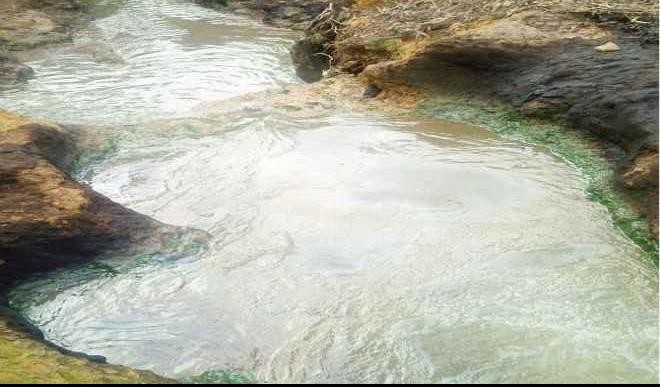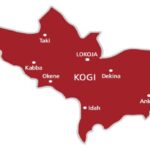
Rido village is a settlement located behind Kaduna Refining and Petrochemical Company (KRPC), 16km away from Kaduna, capital of Kaduna State in North-west Nigeria. It is a sparsely populated multilingual community. Juji Barde village, too, is situated behind the company not far from Rido.
KRPC operates as a subsidiary of the Nigerian National Petroleum Corporation (NNPC), refining crude oil into high quality petroleum products and manufacturing petrochemical and packaging products.
People living in the two villages allege that toxic wastes from the company in the form of gas, liquid and solid substances cause health problems. Gas flares and heavy smells pervade the air around the company most of the time ,while oily substances are spewed directly into the nearby Romi River.
Rido Village
Laboratory analysis on samples of soils and water obtained from both villages and effluent released by the company into a river, indicated the presence of heavy metals that are a threat to human health.
Mr. Jarmai Yusuf, the Ward Head of Juji Barde, said the company was built very close to their houses and farms, and no safety measures were given to the people to deal with the toxic waste emitted by the petrochemical firm.
He said “we believe the toxic gas released in April this year was the cause of many health problems in the village. Black soot settled in the surrounding and contaminated our foods. I couldn’t eat dinner that day; my wife had to prepare another one for me.
“There were similar incidences in the past and when I visited a private clinic in Marabar Rido, a medical personnel told me to stop smoking cigarette after examining my body. But I never smoked cigarette in my life. So, I believe it is the smoke and a gas with the foul odor of rotten eggs from the refinery that we constantly inhale that causes health disorders,” he said.
Danjuma Garba, the Youth Leader in Juji Barde, said toxic gases emitted by some of the units of the refinery are harmful to the residents. He said soot emitted was allegedly harmful to plants and acidifies the river and well water.
 He said, “Sometime in April this year during the company’s production period, there was a sudden loud blast, which those of us living around heard. The blast emitted black smoke and soot which settled all over the village. We made complaints before the company, and some officials came and took pictures and promised to take measures to prevent a recurrence.
He said, “Sometime in April this year during the company’s production period, there was a sudden loud blast, which those of us living around heard. The blast emitted black smoke and soot which settled all over the village. We made complaints before the company, and some officials came and took pictures and promised to take measures to prevent a recurrence.
“The smoke caused headache, cough and vomiting. The company distributed tins of liquid milk. They even repaired our borehole after our complaint.”
He said villagers haven’t done comprehensive medical tests to determine the causes and extent of their illnesses.
He said Juji Barde village relies on well water both for drinking and domestic use but the level of underground water drops during the dry season, making the nearby tributary of Romi River their alternative source of water.
He said, “Chemicals and oil from the company tend to contaminate the water when all the refining units are functioning. The company dug one borehole for us but the pumping device is faulty.”
Maryam Shu’aibu is the Women Leader in Rido who said oily substances allegedly released by the company have seeped into the soil and contaminated the well water. She said exposure to toxic substances from the refinery during prenatal development in mothers ,had affected fetal growth and caused birth defects.
“My son was born with a birth defect like many other children. Many kids had genetic variation that resulted in a speech defect, identified as nasal voices,” she said.
Sarkin Baka in Rido said contaminated substances from KRPC could be allegedly found in food, water, buildings and soil and have caused infertility and other reproductive problems. “I suffer inability as a man and I believe it is caused by toxic waste,” he revealed.
He said villagers have not had any medical analysis or carried out environmental assessments on their claims due to poverty, illiteracy and ignorance.
AbdulRazak Gwarjo lives in Rido with his family. He also said the company emits pollutants into the environment that contaminate food and well water. “In 2012 the company dumped toxic waste in our farms which led to the death of dogs and poultry birds. The victims haven’t received compensation,” he alleged.
He said the sum of N7 billion reportedly released by the government after the incident for cleanup was diverted ,and villagers had written a complaints letter to the Economic and Financial Crimes Commission (EFCC).
He said most of the married women and men in Rido village complained of having one form of reproductive health problem or the other, allegedly linked to the toxic waste from the refinery. “The men complain of weak erection and infertility, while the women complain of frequent abortions and lack of ovulation,” he said.
Medical records obtained from the only primary healthcare facility in Rido, run by Chikun Local Government Council indicated that diarrhoea, vomiting, fever; abdominal pain, headache, painful urination and weight loss were some of the illnesses common in the area.
An analysis of well water samples from Rido by two independent laboratories indicated the presence of heavy metals including lead (0.1449Mg/L), manganese (0.6914) and cadmium (0.0717) above the allowable limits by the Standards Organisation of Nigeria (SON) and World Health Organisation.
Nigerian Industrial Standard (NIS) for drinking water quality compiled by SON indicated that the presence of lead above limits can cause cancer, affect mental development in infants, interfere with vitamin D metabolism and become toxic to the central and peripheral nervous system, while too much manganese and cadmium can cause neurological disorder and kidney problems, respectively. Too much arsenic and chromium can cause cancer while nickel can lead to a possible carcinogenic situation. 
Jummai Bitrus said a pipeline rupture in Rido village in October 2016 spewed oil into her farm and destroyed all the varieties of rice she planted. “I planted step 2, step 5 and quick variety and all were destroyed by oil. I usually harvest 15 bags which I sell to pay the school fees of my children, but I didn’t get anything and the company did not pay compensation even after various promises.”
She said oily substances continued to gush from the rupture site a year after the incident, and caused stunted growth and leaf burning of rice crops.
She said farmers under the auspices of Rido Muslims/Christian/Farmers/Interfaith Cooperative Society Limited have tabled a complaint before the National Human Rights Commission over the matter, and this was confirmed by an official of the commission. Farmers said in the letter that “spill destroyed crops, livestock and soil fertility.”
Usaini Joseph said he has allowed his farm to fallow this year because harmful substances released after the pipeline burst in 2016 reduced soil fertility.
Sarah Paul said the pipeline break near her farm had “reduced soil quality and the rice we planted this year had delayed maturity.”
A lecturer at Kaduna Polytechnic said toxic elements absorbed by plants could contaminate the food chain.
Laboratory analysis of irrigation water samples from the pipeline rupture site showed the presence of lead (0.2439Mg/L) and cadmium (0.0016) in large quantities. The soil samples too, had significant amount of lead (185.8Mg/l), arsenic (33.0), manganese (146.8), iron (6004.2) and nickel (19.4).
Oily sludge which contained toxic and odorous substances were said to be discharged into the nearby tributary of Romi River, behind Juji Barde.
Mohammed Haruna said he fetched sludge ejected into the river in large quantities and sold to villagers who in turn mixed it with clay soil used in building houses. “I have been collecting sludge discharged by the refinery for a long time. We don’t get sufficient sludge to sell now (August 2017) because the company hasn’t refined crude oil for some time. We sold 25 litres sludge for N5,000.”
Farmers in Karadutu village said waste water allegedly from the refinery had in the past destroyed their irrigated crops along the river ,while improperly disposed chemicals polluted the water killing fish and invertebrate animals.
Mr. Daniel Butu has lived in Karatudu with his family since 1986. He grows crops including irrigated crops along the river. He said waste discharged into the river has damaged crops and killed aquatic creatures. “In the past we used to fish in the river but chemicals and oily substances from the refinery have killed all the organisms.
“We caught variety of fishes; some as big as a 13-year-old child but toxic chemicals have killed all the water organisms. You can’t find fish now.” 72-year-old Wada Mai Lambu said oily water from the company polluted farmlands and has damaged crops.
He said “we haven’t seen oily wastewater spilling into our farms for a long time now. But we have built an embankment to prevent erosion from wastewater.”
Analysis of effluent discharged into the river by the company showed the presence of toxic metals. These are lead (0.2501Mg/L), Cadmium (0.0667), nickel (0.0019) and Manganese (0.5855). Soil samples from the river bank too, showed the presence of lead (114.2Mg/L), cadmium (1.00), arsenic (22.2), manganese (903) and nickel (15.6)
Professor Mohammed Dabo is a lecturer in the Department of Petro-Chemical Engineering, Ahmadu Bello University (ABU), Zaria. He said toxic wastes from refineries either pollute the air, water, soil or are harmful to living things generally.
 “However, refineries are designed in a way that they release these wastes in minimal level,” he said.
“However, refineries are designed in a way that they release these wastes in minimal level,” he said.
He said people living around refineries often complain of solid waste deposits around them. “Those deposits are from tiny catalysts from the fluid catalytic cracking unit. So, these are accidents.”
He said if the concentration of gases that escape from refineries is much and are inhaled, they can lead to health problems because they contain some heavy metals.
Group General Manager, Public Affairs Division of the NNPC, Mr. Ndu Ughamadu, said the corporation has an efficient and effective waste disposal system for all the refineries.
“I am equally aware that there is a consultancy unit that has been trying to ensure that the sludge materials are converted into products,” he said.
Ughamadu said Kaduna refinery was one of the best in terms of NNPC’s Corporate Social Responsibility (CRS) to communities among all the refineries.
“As for waste disposal, it is not possible that toxic waste is dumped. The state environmental department frequents the refinery to check, and if they were contravening they would have been sanctioned,” he explained
The General Manager, Kaduna State Environmental Protection Authority, (KEPA) Yusuf Abdullahi Rigasa, said the refinery produced both technical and non-technical wastes and that both are treated before being discharged.
He said “we go there quarterly for compliance monitoring,” adding that KEPA conducts analysis of waste that are suspected to have toxic substances. He said there hasn’t been an Environmental Impact Assessment (EIA) report before the establishment of the refinery, but analysis was done by taking samples from control sites.
He said toxic substances suspected to be from the refinery had caused mass fish-kill in nearby Romi River but “there was no sufficient evidence to link the substances to the refinery.”
He said KEPA had requested the amount of waste substance released into the river on the day of the incident from the company, but the data hasn’t been provided. He added that refuse from the refinery is dumped at a site in Buruku area.
A source with KEPA said most of the harmful effluent is reportedly discharged into the river at night.
 PPM.jpg)
Executive Director, Services, KRPC, Alhaji Abdullahi Idris, said the claims by the villagers on toxic substances were invalid. He said the villagers have taken KRPC to three different courts in Kaduna and Abuja over the matter “and two of them have thrown out the case for lack of merit and one is yet to pass judgment.” A community leader in Rido, AbdulRazak Gwarjo said the two parties involved in the third lawsuit have agreed to settle out of court. He said “our lawyers told us that the court has granted approval for the community and the company to work out a resolution out of court.”




